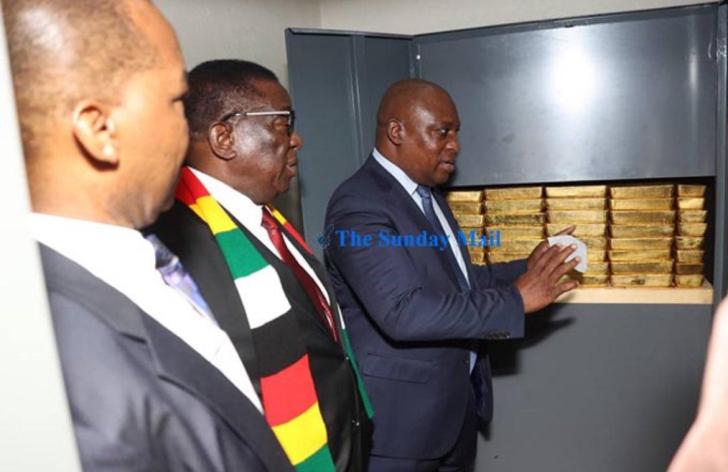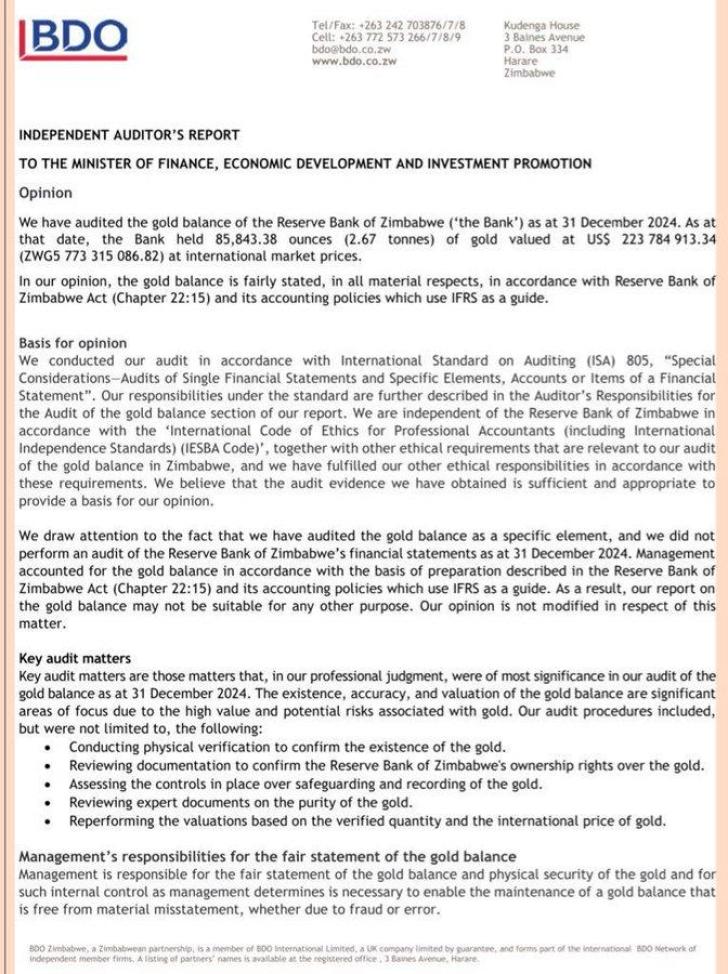News / National
Zimbabwe's gold reserves dwarfed by regional counterparts
5 hrs ago | Views

Zimbabwe's gold reserves stood at 85,842.38 ounces (2.67 tonnes) as of December 31, 2024, valued at $223.8 million, according to an audit by BDO. The figures, based on international market prices, reflect the country's struggle to maintain meaningful reserves amid ongoing economic challenges and stagnation.
The country's foreign exchange reserves amount to just $550 million, providing only three months of import cover. This falls significantly short compared to regional neighbors, underscoring Zimbabwe's precarious economic position. By contrast, Botswana boasts foreign exchange reserves of approximately $4 billion, which equate to seven months of import cover. Similarly, Mozambique's reserves stand at $3.7 billion, while Zambia holds $4.3 billion.
South Africa, the region's largest economy, is far ahead, with foreign exchange reserves rising to $65.9 billion in January 2025, up from $65.5 billion the previous month. Of this, $11 billion is attributed to its gold reserves, amounting to 125.44 tonnes, dwarfing Zimbabwe's holdings. Mozambique's gold reserves, valued at $368.8 million, are also higher than Zimbabwe's, despite its smaller economy.

The stark contrast in reserve levels highlights Zimbabwe's steep economic decline, particularly since the early 2000s. Once the second-largest economy in Southern Africa, Zimbabwe now struggles to maintain even a fraction of the reserves held by its neighbors. The country's economic challenges stem from years of mismanagement, corruption, and a reliance on imports due to declining industrial output.
Critics have described Zimbabwe's current economic state as that of a “tuckshop economy,” incapable of sustaining essential imports like fuel and medicines or cushioning itself against external shocks. The low reserve levels reflect an ongoing struggle to attract foreign investment and stabilize the country's fragile financial systems.
Economists warn that without significant reforms to boost gold production and industrial capacity, Zimbabwe risks further economic isolation. While neighboring countries like Botswana and South Africa continue to implement sound economic policies and resource management, Zimbabwe has yet to articulate a clear strategy for rebuilding its reserves and restoring economic confidence.
The figures serve as a sobering reminder of what Zimbabwe has lost and the urgent need for structural reforms to regain its former regional standing. Without action, the gap between Zimbabwe and its neighbors will only widen, leaving the nation increasingly vulnerable to economic shocks.
The country's foreign exchange reserves amount to just $550 million, providing only three months of import cover. This falls significantly short compared to regional neighbors, underscoring Zimbabwe's precarious economic position. By contrast, Botswana boasts foreign exchange reserves of approximately $4 billion, which equate to seven months of import cover. Similarly, Mozambique's reserves stand at $3.7 billion, while Zambia holds $4.3 billion.
South Africa, the region's largest economy, is far ahead, with foreign exchange reserves rising to $65.9 billion in January 2025, up from $65.5 billion the previous month. Of this, $11 billion is attributed to its gold reserves, amounting to 125.44 tonnes, dwarfing Zimbabwe's holdings. Mozambique's gold reserves, valued at $368.8 million, are also higher than Zimbabwe's, despite its smaller economy.

Critics have described Zimbabwe's current economic state as that of a “tuckshop economy,” incapable of sustaining essential imports like fuel and medicines or cushioning itself against external shocks. The low reserve levels reflect an ongoing struggle to attract foreign investment and stabilize the country's fragile financial systems.
Economists warn that without significant reforms to boost gold production and industrial capacity, Zimbabwe risks further economic isolation. While neighboring countries like Botswana and South Africa continue to implement sound economic policies and resource management, Zimbabwe has yet to articulate a clear strategy for rebuilding its reserves and restoring economic confidence.
The figures serve as a sobering reminder of what Zimbabwe has lost and the urgent need for structural reforms to regain its former regional standing. Without action, the gap between Zimbabwe and its neighbors will only widen, leaving the nation increasingly vulnerable to economic shocks.
Source - online










































